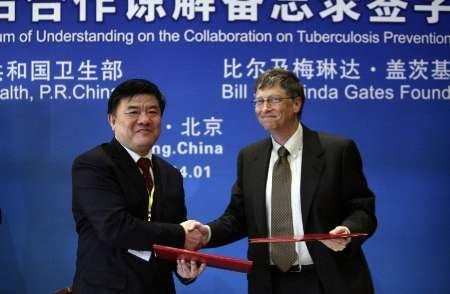Gates Foundation to improve child vaccines in China

The Bill and Melinda Gates Foundation is helping partners in China improve child vaccines, roll out faster TB detection kits and make higher-yielding rice which it hopes can be used later in other parts of the world.
Ray Yip, the foundation's chief representative in China, said they were especially interested in vaccines against rotavirus, which causes diarrhea in young children, and pneumococcal disease, which causes pneumonia.
We are looking at the possibility of working with some (Chinese vaccine makers) who are willing to go global, instead of right now only busy developing vaccines for China, Yip told Reuters on the sidelines of a healthcare conference in Hong Kong.
So their production, quality and capacity only meet the China standard. If they want to go global to help Africa and other countries, they need to bring them up to certain international standard. So we are developing programs which are accelerating their research program and improving their ability to meet international standard, he said.
We are investing to make the product better and cheaper.
Rotavirus vaccines made by GlaxoSmithKline and Merck and Sanofi Aventis are now part of the regular schedule for infants in the United States and other developed countries.
But the virus continues to kill 400,000 children every year in the poorest places which cannot afford it.
Pneumococcal disease, which causes pneumonia, meningitis and sepsis, kills more than half a million children every year, mostly in very poor countries.
TO BRING VACCINE PRICES DOWN
Yip hopes to bring costs of the pneumococcal vaccine down to US$5 per dose. Now, a dose costs around US$100 and immunizing a child against pneumococcal disease takes three doses.
The foundation is also introducing better and faster kits in China to diagnose both conventional and drug-resistant tuberculosis, he added.
Two-thirds of the foundation's spending each year goes to healthcare. The foundation spent in total $3.2 billion in 2010.
The foundation is also joining hands with an agricultural partner in China to engineer higher yielding rice which it eventually hopes can be planted in other developing countries.
It should give greater yields and be less dependent on fertilizers, Yip said.
Our focus is more of using China as a development partner to assist other countries, whether it be to develop better vaccines, whether it be rolling out diagnostic tools, or whether it be a better yielding rice, those are examples.
© Copyright Thomson Reuters 2024. All rights reserved.





















